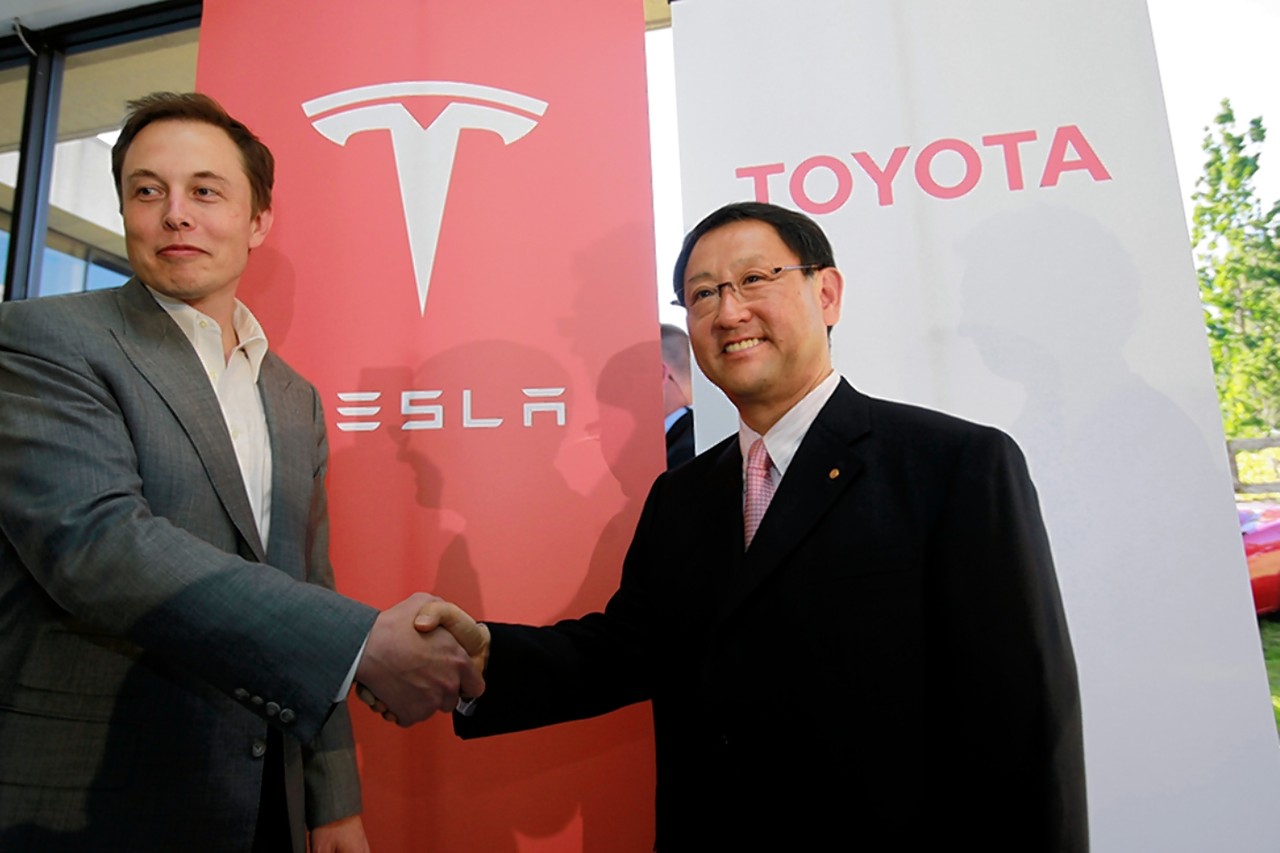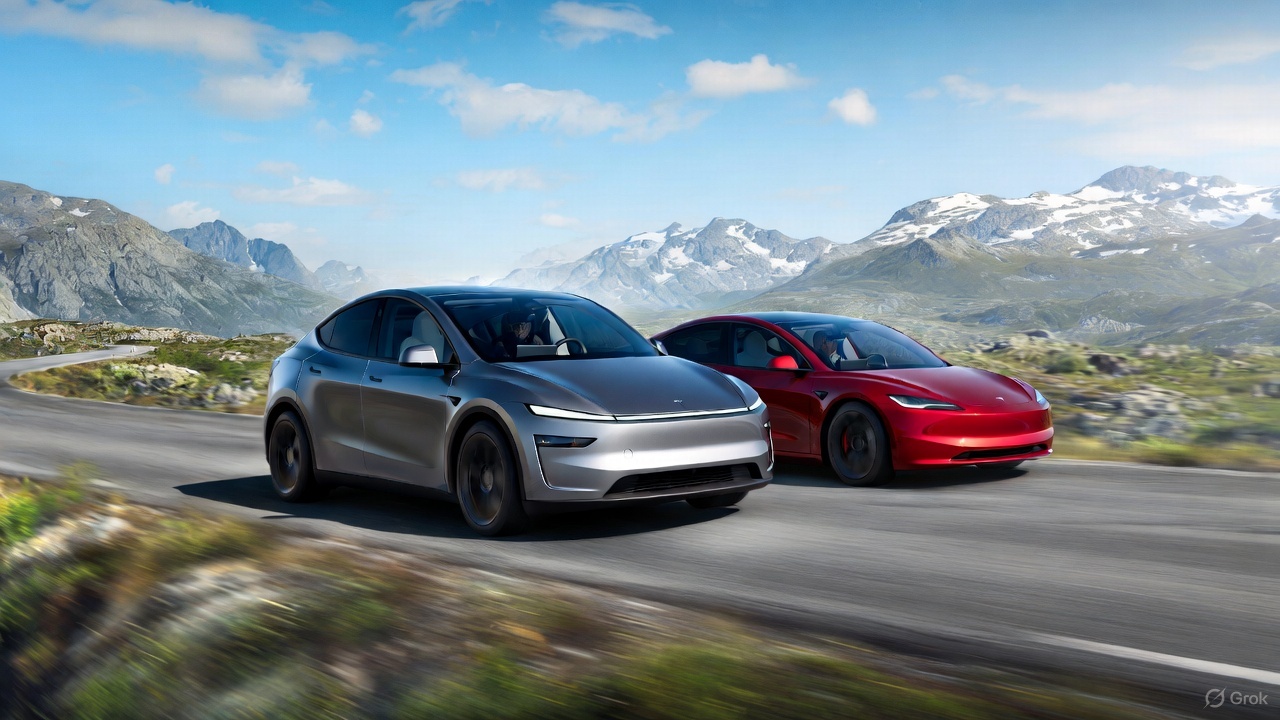News
Toyota smells the coffee, wants a piece of Tesla’s market share but it’s too late

A new report coming out of the Nikkei, announced that Toyota is planning to enter the battery electric vehicle (BEV) business with development of its own long range vehicle slated for mass production in 2020.
News that the world’s largest automaker has plans to produce a 300 km (186 mile) BEV could be a sign that the company shifted development focus away from its fuel-cell vehicles, in particular its hydrogen powered Mirai, in order to compete with Tesla and GM within the growing EV space.
According to the Nikkei Asian Review via Autoblog, Toyota’s plan to mass produce its first all electric vehicle by 2020 coincides with timing for the next 2020 Olympics to be held in Tokyo. Toyota is said to be a major sponsor of the Olympics so it would come as no surprise that the company will take stage and use the opportunity to unveil a new line of products.
The Nikkei reports that Toyota plans to “bolster development of batteries” through the company’s battery material research department but also acquire batteries from outside sources in order to keep costs of its future EV competitive. This is in sharp contrast to the Japanese automaker’s previous strong belief that EVs would never become mainstream due to the high cost of batteries and limited driving range.
In a statement issued to Autoblog, Toyota states that any potential development in its BEV will happen in parallel with fuel-cell vehicles:
“We would like to refrain from commenting on such details, such as the schedule of development and production since it relates to our future product plan.
Toyota has made efforts in every direction on various powertrains, including electric vehicles (EVs), when it comes to the development of environmentally friendly vehicles. Toyota will continue to improve on the development of eco-cars, ranging from hybrids (HVs) and plug-in hybrids (PHVs), to electric and fuel-cell vehicles (FCVs), based on the advantages and capabilities of each powertrain.
We believe that environmentally friendly vehicles can only help to improve the environment if they become available to a large number of customers, and in relation to this, Toyota will consider introducing EVs to the market.
We will consider the roll-out of EVs alongside Toyota’s FCV lineup, which are both zero emission vehicles, based on the advantages and capabilities of each, as well as the market conditions of each region/country, as we continue to closely monitor the corresponding situations.”
Toyota has finally seen the writing on the wall though it may be too late. With Tesla having already received 373,000 deposits on its affordable mass market Model 3, planned to go into production next year, and GM going to market with its new 2017 Chevrolet Bolt with an EPA-rated 238 miles of range, Toyota clearly has a lot of catching up to do, especially if it intends to be competitive within the electric vehicle space. Not to mention, Tesla has a significant advantage over other automakers because of its existing global network of Supercharger stations.

News
Tesla back on top as Norway’s EV market surges to 98% share in February
Tesla became Norway’s top-selling brand with 1,210 registrations, representing a 16.6% share.

Tesla reclaimed the top spot in Norway’s auto market in February as electric vehicles captured more than 98% of all new car registrations.
The rebound follows a sharp January slump triggered by VAT rule changes, which prompted numerous car buyers to advance their purchases into late 2025.
As per data from the Norwegian Road Traffic Information Council (OFV), 7,127 new electric vehicles were registered in February, representing a 98.01% market share. Fossil-fuel vehicles and hybrids accounted for just 2% of total new registrations.
Total new car registrations reached 7,272 units in February, hinting at a rapid recovery after January sales fell nearly 75% year-over-year following VAT adjustments.
OFV Director Geir Inge Stokke noted that similar patterns were observed after previous VAT changes in 2022, with demand temporarily weakening before normalizing, as noted in an Allt Om Elbil report.
“We are now seeing signs that the market is returning to a more normal level of activity, which we also experienced after the VAT change in 2022. At that time, changes in demand led to a weak start to 2023. We have seen the same pattern this year,” he said.
Amidst this trend, the Tesla Model Y made a strong comeback in the domestic market. After an unusually weak January that saw the Tesla Model Y drop to seventh place, the model returned to the top of Norway’s sales chart in February.
The Model Y recorded 1,073 registrations, giving it a 14.8% market share for the month. Tesla also became Norway’s top-selling brand with 1,210 registrations, representing a 16.6% share. Toyota followed with 941 registrations, while Volkswagen, Volvo, and Skoda rounded out the top five brands.
The February data suggests that Tesla’s January dip was tied more to timing effects around VAT adjustments than to structural demand shifts. It would then be interesting to see how the rest of the year unfolds for Tesla, particularly as the company pushes for the release of its Full Self-Driving (Supervised) system to Europe this year.
News
Tesla arson suspect pleads guilty, faces up to 70 years in prison
The update was announced by the U.S. Attorney’s Office for the District of Nevada.

A Las Vegas man has pleaded guilty to federal arson charges tied to a March 2025 attack on a Tesla Collision Center in Nevada.
The update was announced by the U.S. Attorney’s Office for the District of Nevada.
According to court documents, on March 18, 2025, Paul Hyon Kim spray-painted the word “RESIST” on the front entrance of the Tesla Collision Center before damaging the facility and multiple vehicles.
Federal prosecutors stated that Kim used a PA-15 multi-caliber firearm equipped with a .300 BLACKOUT upper receiver and a 7.62mm silencer to shoot out surveillance cameras. He then fired multiple rounds into Tesla vehicles on the property.
Authorities stated that Kim later threw three Molotov cocktails into three separate Tesla vehicles. Two of the devices exploded and ignited the vehicles, while a third did not detonate. In total, five Tesla vehicles were damaged in the incident.
Kim pleaded guilty to two counts of arson of property used in interstate commerce, one count of attempted arson of property used in interstate commerce, and one count of unlawful possession of an unregistered firearm classified as a destructive device.
The mandatory minimum sentence for the charges is five years in federal prison, though the total maximum statutory penalty is 70 years, as per a release from the United States Attorney’s Office of the District of Nevada.
Sentencing is scheduled for May 27, 2026, before U.S. District Judge Jennifer A. Dorsey. A federal judge will determine the final sentence after considering the U.S. Sentencing Guidelines and other statutory factors.
The case was investigated by the FBI, the Bureau of Alcohol, Tobacco, Firearms and Explosives, and the Las Vegas Metropolitan Police Department, with assistance from the Clark County Fire Department.
Elon Musk
SpaceX pursues 5G-level connectivity with Starlink Mobile V2 expansion
SpaceX noted that the upcoming Starlink V2 satellites will deliver up to 100 times the data density of the current first-generation system.

SpaceX has previewed a major upgrade to Starlink Mobile, outlining next-generation satellites that aim to deliver significantly higher capacity and full 5G-level connectivity directly to mobile phones.
The update comes as Starlink rebrands its Direct-to-Cell service to Starlink Mobile, positioning the platform as a scalable satellite-to-mobile solution that’s integrated with global telecom partners.
SpaceX noted that the upcoming Starlink V2 satellites will deliver up to 100 times the data density of the current first-generation system. The company also noted that the new V2 satellites are designed to provide significantly higher throughput capability compared to its current iteration.
“The next generation of Starlink Mobile satellites – V2 – will deliver full cellular coverage to places never thought possible via the highest performing satellite-to-mobile network ever built.
“Driven by custom SpaceX-designed silicon and phased array antennas, the satellites will support thousands of spatial beams and higher bandwidth capability, enabling around 20x the throughput capability as compared to a first-generation satellite,” SpaceX wrote in its official Starlink Mobile page.
Thanks to the higher bandwidth of Starlink Mobile, users should be able to stream, browse the internet, use high-speed apps, and enjoy voice services comparable to terrestrial cellular networks.
In most environments, Starlink says the upgraded system will enable full 5G cellular connectivity with a user experience similar to existing ground-based networks.
The satellites function as “cell towers in space,” using advanced phased-array antennas and laser interlinks to integrate with terrestrial infrastructure in a roaming-like architecture.
“Starlink Mobile works with existing LTE phones wherever you can see the sky. The satellites have an antenna that acts like a cellphone tower in space, the most advanced phased array antennas in the world that connect seamlessly over lasers to any point in the globe, allowing network integration similar to a standard roaming partner,” SpaceX wrote.
Starlink Mobile currently operates with approximately 650 satellites in low-Earth orbit and is active across more than 32 countries, representing over 1.7 billion people through partnerships with mobile network operators. Starlink Mobile’s current partnerships span North America, Europe, Asia, Africa, and Oceania, allowing reciprocal access across participating nations.








